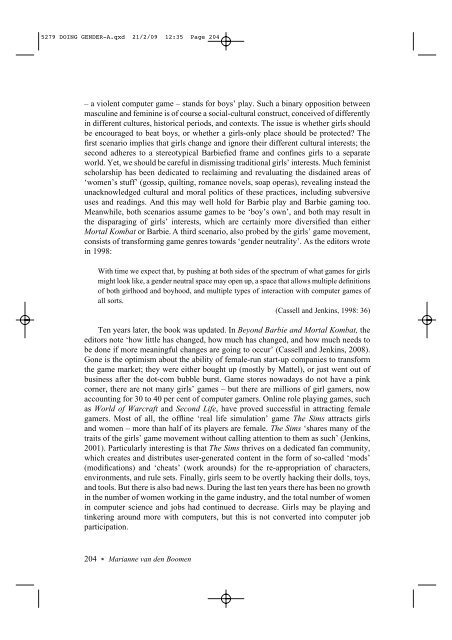Hacking Barbie in gendered computer culture
Hacking Barbie in gendered computer culture
Hacking Barbie in gendered computer culture
You also want an ePaper? Increase the reach of your titles
YUMPU automatically turns print PDFs into web optimized ePapers that Google loves.
5279 DOING GENDER-A.qxd 21/2/09 12:35 Page 204<br />
– a violent <strong>computer</strong> game – stands for boys’ play. Such a b<strong>in</strong>ary opposition between<br />
mascul<strong>in</strong>e and fem<strong>in</strong><strong>in</strong>e is of course a social-cultural construct, conceived of differently<br />
<strong>in</strong> different <strong>culture</strong>s, historical periods, and contexts. The issue is whether girls should<br />
be encouraged to beat boys, or whether a girls-only place should be protected? The<br />
first scenario implies that girls change and ignore their different cultural <strong>in</strong>terests; the<br />
second adheres to a stereotypical <strong>Barbie</strong>fied frame and conf<strong>in</strong>es girls to a separate<br />
world. Yet, we should be careful <strong>in</strong> dismiss<strong>in</strong>g traditional girls’ <strong>in</strong>terests. Much fem<strong>in</strong>ist<br />
scholarship has been dedicated to reclaim<strong>in</strong>g and revaluat<strong>in</strong>g the disda<strong>in</strong>ed areas of<br />
‘women’s stuff’ (gossip, quilt<strong>in</strong>g, romance novels, soap operas), reveal<strong>in</strong>g <strong>in</strong>stead the<br />
unacknowledged cultural and moral politics of these practices, <strong>in</strong>clud<strong>in</strong>g subversive<br />
uses and read<strong>in</strong>gs. And this may well hold for <strong>Barbie</strong> play and <strong>Barbie</strong> gam<strong>in</strong>g too.<br />
Meanwhile, both scenarios assume games to be ‘boy’s own’, and both may result <strong>in</strong><br />
the disparag<strong>in</strong>g of girls’ <strong>in</strong>terests, which are certa<strong>in</strong>ly more diversified than either<br />
Mortal Kombat or <strong>Barbie</strong>. A third scenario, also probed by the girls’ game movement,<br />
consists of transform<strong>in</strong>g game genres towards ‘gender neutrality’. As the editors wrote<br />
<strong>in</strong> 1998:<br />
With time we expect that, by push<strong>in</strong>g at both sides of the spectrum of what games for girls<br />
might look like, a gender neutral space may open up, a space that allows multiple def<strong>in</strong>itions<br />
of both girlhood and boyhood, and multiple types of <strong>in</strong>teraction with <strong>computer</strong> games of<br />
all sorts.<br />
(Cassell and Jenk<strong>in</strong>s, 1998: 36)<br />
Ten years later, the book was updated. In Beyond <strong>Barbie</strong> and Mortal Kombat, the<br />
editors note ‘how little has changed, how much has changed, and how much needs to<br />
be done if more mean<strong>in</strong>gful changes are go<strong>in</strong>g to occur’ (Cassell and Jenk<strong>in</strong>s, 2008).<br />
Gone is the optimism about the ability of female-run start-up companies to transform<br />
the game market; they were either bought up (mostly by Mattel), or just went out of<br />
bus<strong>in</strong>ess after the dot-com bubble burst. Game stores nowadays do not have a p<strong>in</strong>k<br />
corner, there are not many girls’ games – but there are millions of girl gamers, now<br />
account<strong>in</strong>g for 30 to 40 per cent of <strong>computer</strong> gamers. Onl<strong>in</strong>e role play<strong>in</strong>g games, such<br />
as World of Warcraft and Second Life, have proved successful <strong>in</strong> attract<strong>in</strong>g female<br />
gamers. Most of all, the offl<strong>in</strong>e ‘real life simulation’ game The Sims attracts girls<br />
and women – more than half of its players are female. The Sims ‘shares many of the<br />
traits of the girls’ game movement without call<strong>in</strong>g attention to them as such’ (Jenk<strong>in</strong>s,<br />
2001). Particularly <strong>in</strong>terest<strong>in</strong>g is that The Sims thrives on a dedicated fan community,<br />
which creates and distributes user-generated content <strong>in</strong> the form of so-called ‘mods’<br />
(modifications) and ‘cheats’ (work arounds) for the re-appropriation of characters,<br />
environments, and rule sets. F<strong>in</strong>ally, girls seem to be overtly hack<strong>in</strong>g their dolls, toys,<br />
and tools. But there is also bad news. Dur<strong>in</strong>g the last ten years there has been no growth<br />
<strong>in</strong> the number of women work<strong>in</strong>g <strong>in</strong> the game <strong>in</strong>dustry, and the total number of women<br />
<strong>in</strong> <strong>computer</strong> science and jobs had cont<strong>in</strong>ued to decrease. Girls may be play<strong>in</strong>g and<br />
t<strong>in</strong>ker<strong>in</strong>g around more with <strong>computer</strong>s, but this is not converted <strong>in</strong>to <strong>computer</strong> job<br />
participation.<br />
204 • Marianne van den Boomen


